KSA Change Management: Cultural Impact & Implementation Analysis
VerifiedAdded on 2023/06/05
|7
|1274
|477
Report
AI Summary
This report analyzes change management processes in Saudi Arabia, considering the nation's unique cultural context as defined by Hofstede's model. The high power distance and collectivist nature of Saudi Arabian society influence how organizations implement change, often leading to top-down approaches without employee consultation. While this can save time and resources, it also poses risks, as neglecting employee input may result in resistance, delayed adoption, and failure to achieve desired outcomes. The report concludes that incorporating employee perspectives is crucial for successful change management, even within the hierarchical structure of KSA companies, to ensure alignment with customer expectations and organizational goals. Desklib provides access to similar solved assignments and past papers for students.
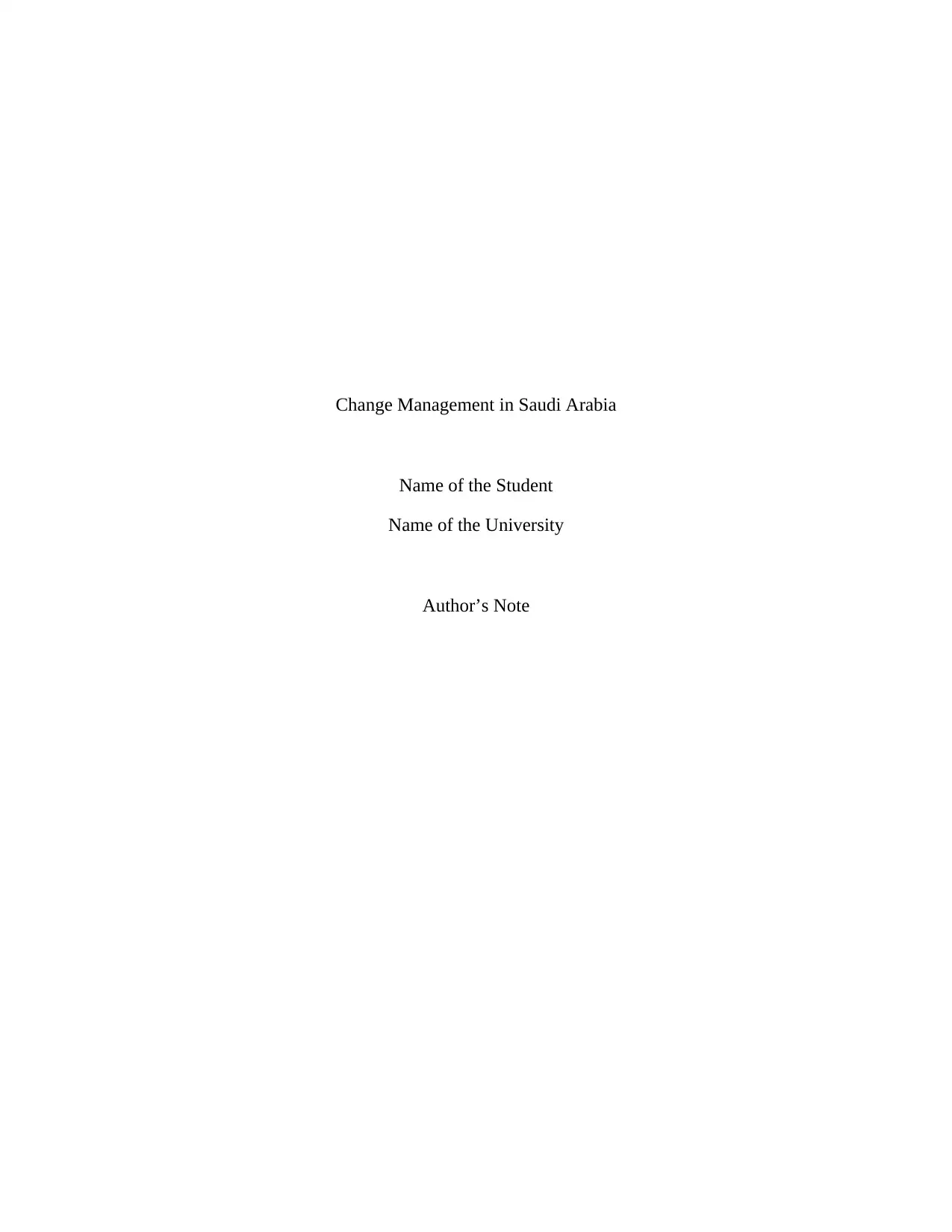
Change Management in Saudi Arabia
Name of the Student
Name of the University
Author’s Note
Name of the Student
Name of the University
Author’s Note
Paraphrase This Document
Need a fresh take? Get an instant paraphrase of this document with our AI Paraphraser
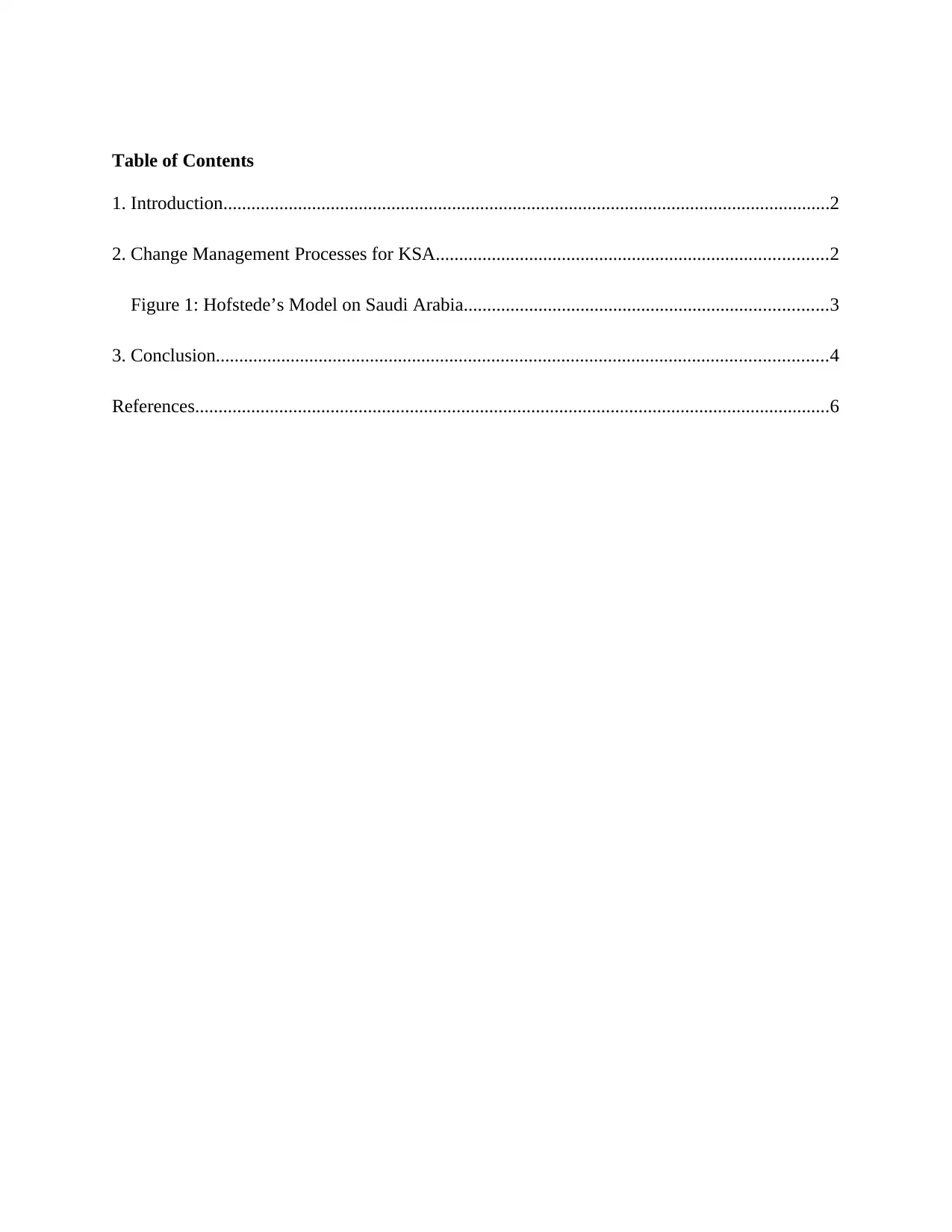
Table of Contents
1. Introduction..................................................................................................................................2
2. Change Management Processes for KSA....................................................................................2
Figure 1: Hofstede’s Model on Saudi Arabia..............................................................................3
3. Conclusion...................................................................................................................................4
References........................................................................................................................................6
1. Introduction..................................................................................................................................2
2. Change Management Processes for KSA....................................................................................2
Figure 1: Hofstede’s Model on Saudi Arabia..............................................................................3
3. Conclusion...................................................................................................................................4
References........................................................................................................................................6
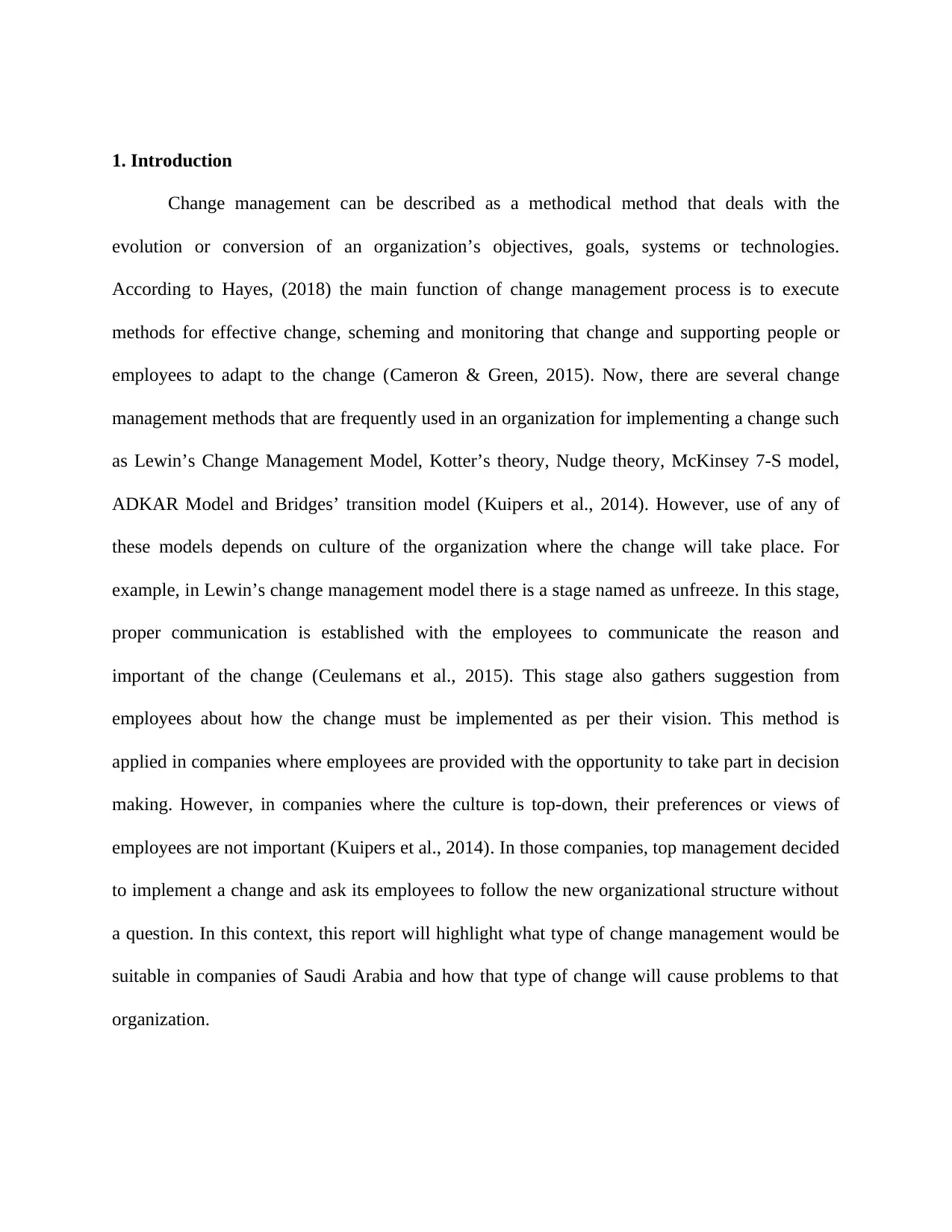
1. Introduction
Change management can be described as a methodical method that deals with the
evolution or conversion of an organization’s objectives, goals, systems or technologies.
According to Hayes, (2018) the main function of change management process is to execute
methods for effective change, scheming and monitoring that change and supporting people or
employees to adapt to the change (Cameron & Green, 2015). Now, there are several change
management methods that are frequently used in an organization for implementing a change such
as Lewin’s Change Management Model, Kotter’s theory, Nudge theory, McKinsey 7-S model,
ADKAR Model and Bridges’ transition model (Kuipers et al., 2014). However, use of any of
these models depends on culture of the organization where the change will take place. For
example, in Lewin’s change management model there is a stage named as unfreeze. In this stage,
proper communication is established with the employees to communicate the reason and
important of the change (Ceulemans et al., 2015). This stage also gathers suggestion from
employees about how the change must be implemented as per their vision. This method is
applied in companies where employees are provided with the opportunity to take part in decision
making. However, in companies where the culture is top-down, their preferences or views of
employees are not important (Kuipers et al., 2014). In those companies, top management decided
to implement a change and ask its employees to follow the new organizational structure without
a question. In this context, this report will highlight what type of change management would be
suitable in companies of Saudi Arabia and how that type of change will cause problems to that
organization.
Change management can be described as a methodical method that deals with the
evolution or conversion of an organization’s objectives, goals, systems or technologies.
According to Hayes, (2018) the main function of change management process is to execute
methods for effective change, scheming and monitoring that change and supporting people or
employees to adapt to the change (Cameron & Green, 2015). Now, there are several change
management methods that are frequently used in an organization for implementing a change such
as Lewin’s Change Management Model, Kotter’s theory, Nudge theory, McKinsey 7-S model,
ADKAR Model and Bridges’ transition model (Kuipers et al., 2014). However, use of any of
these models depends on culture of the organization where the change will take place. For
example, in Lewin’s change management model there is a stage named as unfreeze. In this stage,
proper communication is established with the employees to communicate the reason and
important of the change (Ceulemans et al., 2015). This stage also gathers suggestion from
employees about how the change must be implemented as per their vision. This method is
applied in companies where employees are provided with the opportunity to take part in decision
making. However, in companies where the culture is top-down, their preferences or views of
employees are not important (Kuipers et al., 2014). In those companies, top management decided
to implement a change and ask its employees to follow the new organizational structure without
a question. In this context, this report will highlight what type of change management would be
suitable in companies of Saudi Arabia and how that type of change will cause problems to that
organization.
⊘ This is a preview!⊘
Do you want full access?
Subscribe today to unlock all pages.

Trusted by 1+ million students worldwide
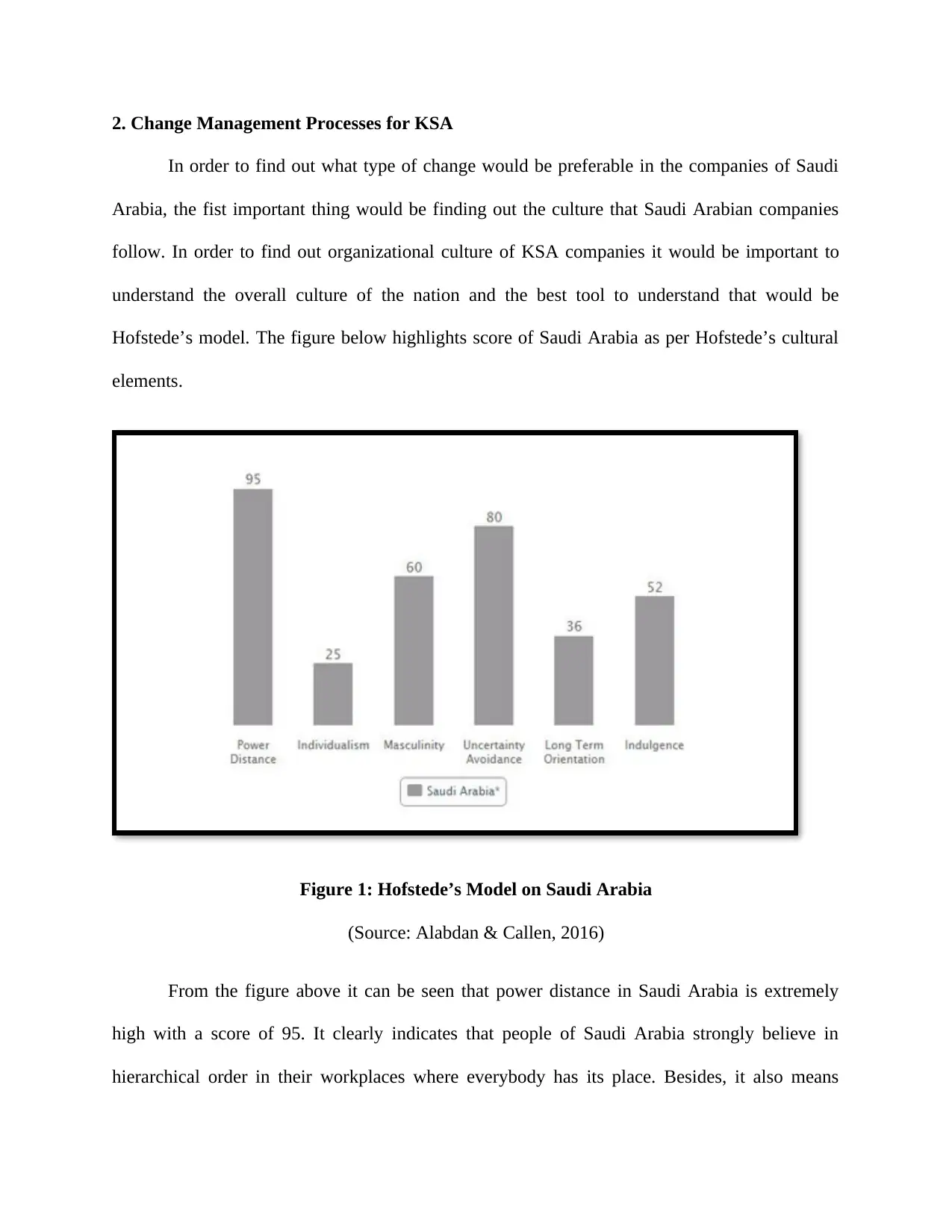
2. Change Management Processes for KSA
In order to find out what type of change would be preferable in the companies of Saudi
Arabia, the fist important thing would be finding out the culture that Saudi Arabian companies
follow. In order to find out organizational culture of KSA companies it would be important to
understand the overall culture of the nation and the best tool to understand that would be
Hofstede’s model. The figure below highlights score of Saudi Arabia as per Hofstede’s cultural
elements.
Figure 1: Hofstede’s Model on Saudi Arabia
(Source: Alabdan & Callen, 2016)
From the figure above it can be seen that power distance in Saudi Arabia is extremely
high with a score of 95. It clearly indicates that people of Saudi Arabia strongly believe in
hierarchical order in their workplaces where everybody has its place. Besides, it also means
In order to find out what type of change would be preferable in the companies of Saudi
Arabia, the fist important thing would be finding out the culture that Saudi Arabian companies
follow. In order to find out organizational culture of KSA companies it would be important to
understand the overall culture of the nation and the best tool to understand that would be
Hofstede’s model. The figure below highlights score of Saudi Arabia as per Hofstede’s cultural
elements.
Figure 1: Hofstede’s Model on Saudi Arabia
(Source: Alabdan & Callen, 2016)
From the figure above it can be seen that power distance in Saudi Arabia is extremely
high with a score of 95. It clearly indicates that people of Saudi Arabia strongly believe in
hierarchical order in their workplaces where everybody has its place. Besides, it also means
Paraphrase This Document
Need a fresh take? Get an instant paraphrase of this document with our AI Paraphraser
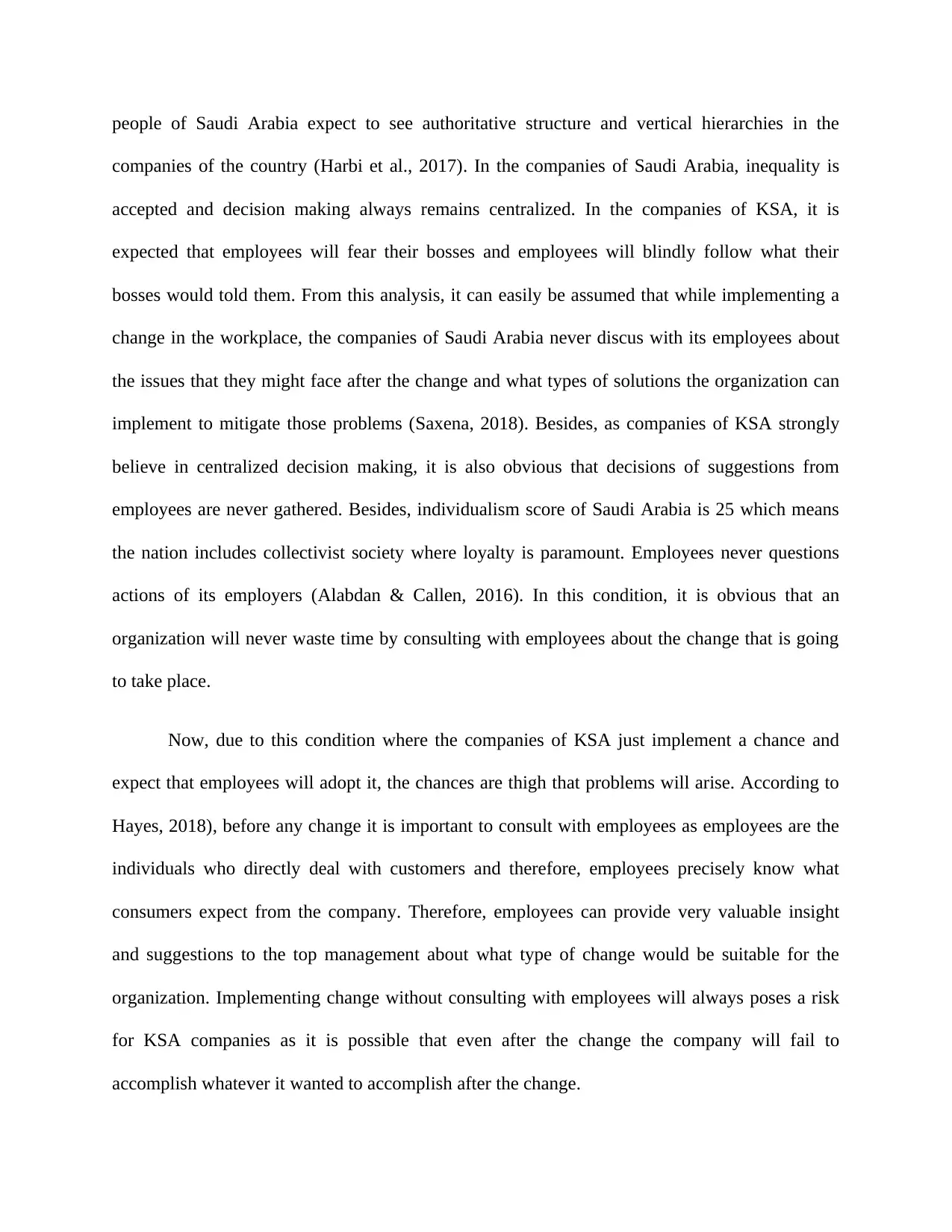
people of Saudi Arabia expect to see authoritative structure and vertical hierarchies in the
companies of the country (Harbi et al., 2017). In the companies of Saudi Arabia, inequality is
accepted and decision making always remains centralized. In the companies of KSA, it is
expected that employees will fear their bosses and employees will blindly follow what their
bosses would told them. From this analysis, it can easily be assumed that while implementing a
change in the workplace, the companies of Saudi Arabia never discus with its employees about
the issues that they might face after the change and what types of solutions the organization can
implement to mitigate those problems (Saxena, 2018). Besides, as companies of KSA strongly
believe in centralized decision making, it is also obvious that decisions of suggestions from
employees are never gathered. Besides, individualism score of Saudi Arabia is 25 which means
the nation includes collectivist society where loyalty is paramount. Employees never questions
actions of its employers (Alabdan & Callen, 2016). In this condition, it is obvious that an
organization will never waste time by consulting with employees about the change that is going
to take place.
Now, due to this condition where the companies of KSA just implement a chance and
expect that employees will adopt it, the chances are thigh that problems will arise. According to
Hayes, 2018), before any change it is important to consult with employees as employees are the
individuals who directly deal with customers and therefore, employees precisely know what
consumers expect from the company. Therefore, employees can provide very valuable insight
and suggestions to the top management about what type of change would be suitable for the
organization. Implementing change without consulting with employees will always poses a risk
for KSA companies as it is possible that even after the change the company will fail to
accomplish whatever it wanted to accomplish after the change.
companies of the country (Harbi et al., 2017). In the companies of Saudi Arabia, inequality is
accepted and decision making always remains centralized. In the companies of KSA, it is
expected that employees will fear their bosses and employees will blindly follow what their
bosses would told them. From this analysis, it can easily be assumed that while implementing a
change in the workplace, the companies of Saudi Arabia never discus with its employees about
the issues that they might face after the change and what types of solutions the organization can
implement to mitigate those problems (Saxena, 2018). Besides, as companies of KSA strongly
believe in centralized decision making, it is also obvious that decisions of suggestions from
employees are never gathered. Besides, individualism score of Saudi Arabia is 25 which means
the nation includes collectivist society where loyalty is paramount. Employees never questions
actions of its employers (Alabdan & Callen, 2016). In this condition, it is obvious that an
organization will never waste time by consulting with employees about the change that is going
to take place.
Now, due to this condition where the companies of KSA just implement a chance and
expect that employees will adopt it, the chances are thigh that problems will arise. According to
Hayes, 2018), before any change it is important to consult with employees as employees are the
individuals who directly deal with customers and therefore, employees precisely know what
consumers expect from the company. Therefore, employees can provide very valuable insight
and suggestions to the top management about what type of change would be suitable for the
organization. Implementing change without consulting with employees will always poses a risk
for KSA companies as it is possible that even after the change the company will fail to
accomplish whatever it wanted to accomplish after the change.
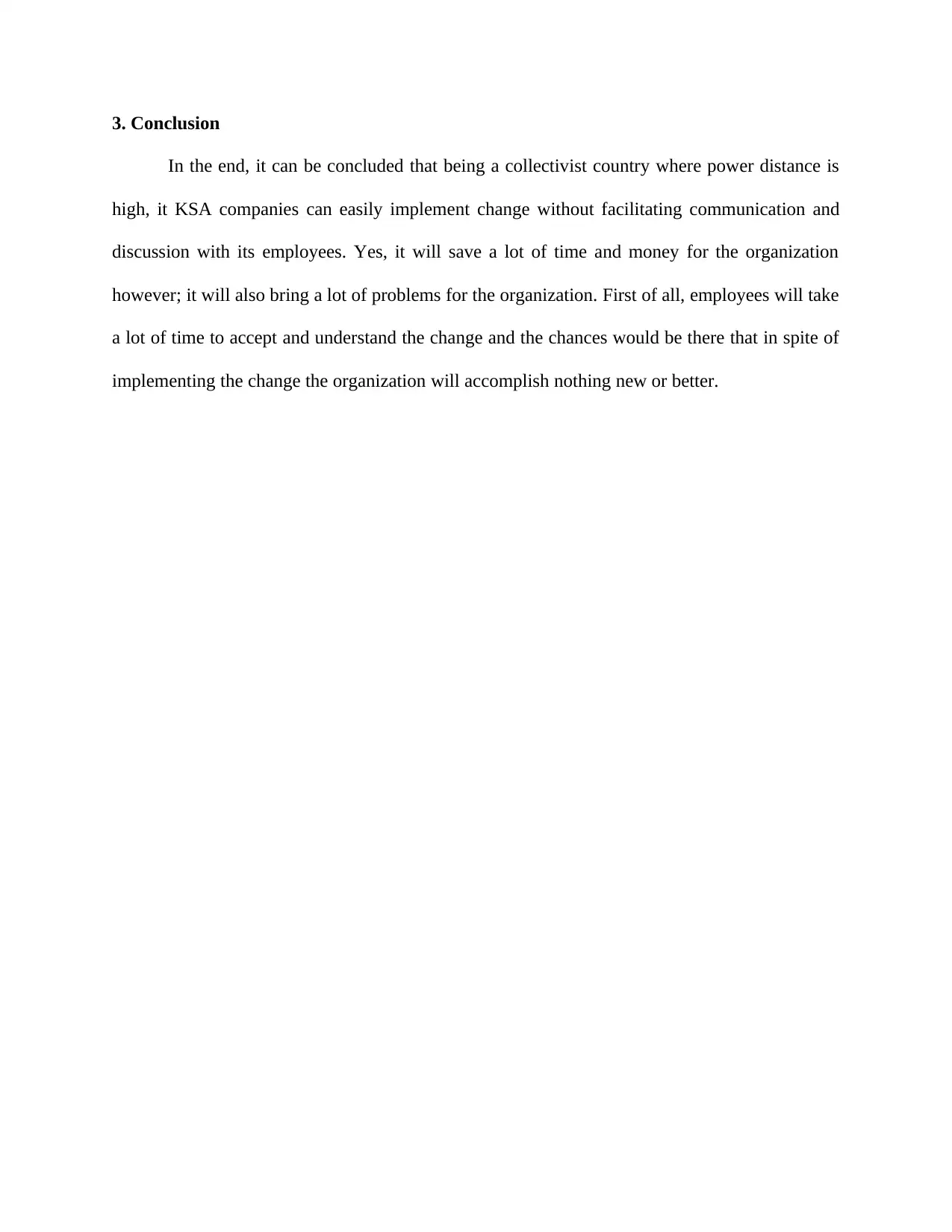
3. Conclusion
In the end, it can be concluded that being a collectivist country where power distance is
high, it KSA companies can easily implement change without facilitating communication and
discussion with its employees. Yes, it will save a lot of time and money for the organization
however; it will also bring a lot of problems for the organization. First of all, employees will take
a lot of time to accept and understand the change and the chances would be there that in spite of
implementing the change the organization will accomplish nothing new or better.
In the end, it can be concluded that being a collectivist country where power distance is
high, it KSA companies can easily implement change without facilitating communication and
discussion with its employees. Yes, it will save a lot of time and money for the organization
however; it will also bring a lot of problems for the organization. First of all, employees will take
a lot of time to accept and understand the change and the chances would be there that in spite of
implementing the change the organization will accomplish nothing new or better.
⊘ This is a preview!⊘
Do you want full access?
Subscribe today to unlock all pages.

Trusted by 1+ million students worldwide
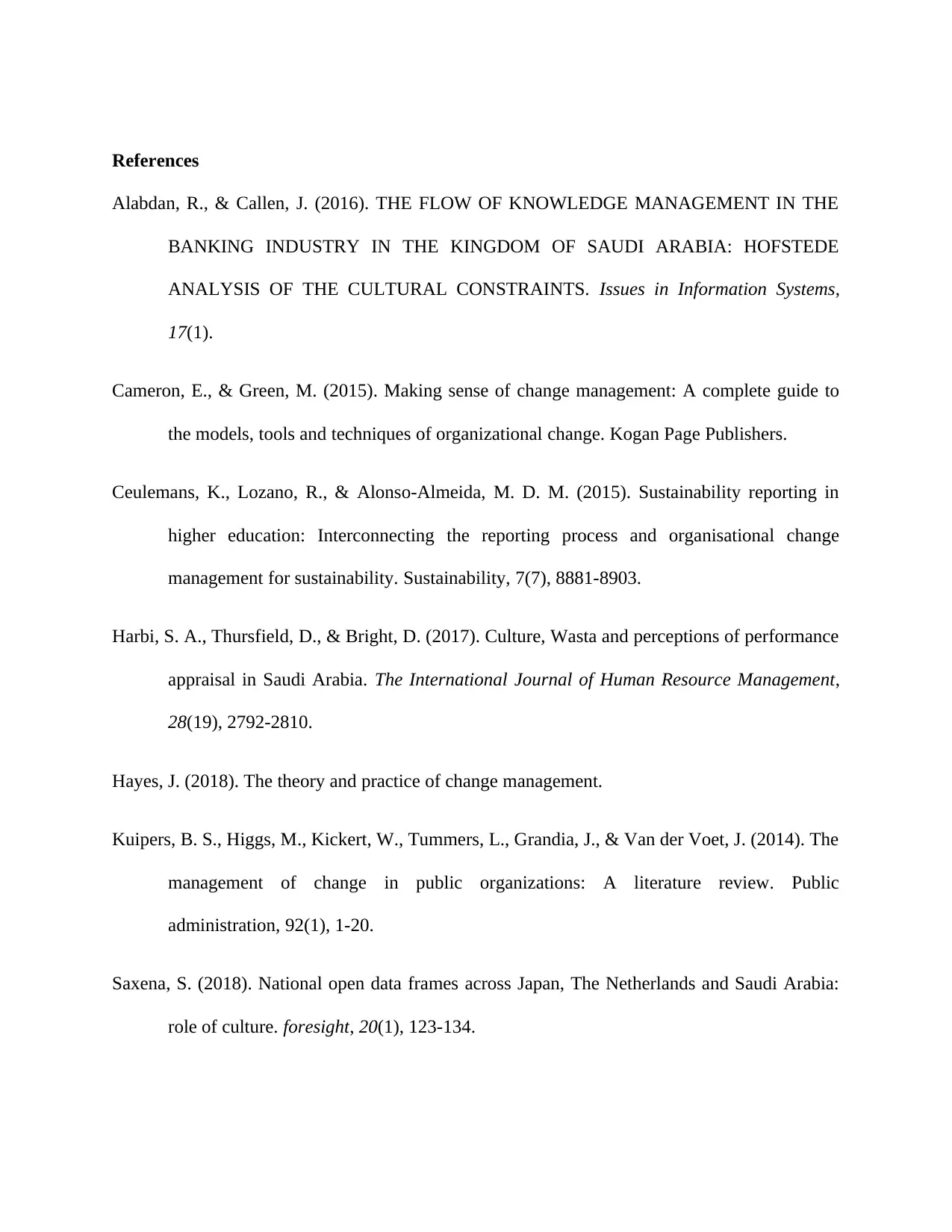
References
Alabdan, R., & Callen, J. (2016). THE FLOW OF KNOWLEDGE MANAGEMENT IN THE
BANKING INDUSTRY IN THE KINGDOM OF SAUDI ARABIA: HOFSTEDE
ANALYSIS OF THE CULTURAL CONSTRAINTS. Issues in Information Systems,
17(1).
Cameron, E., & Green, M. (2015). Making sense of change management: A complete guide to
the models, tools and techniques of organizational change. Kogan Page Publishers.
Ceulemans, K., Lozano, R., & Alonso-Almeida, M. D. M. (2015). Sustainability reporting in
higher education: Interconnecting the reporting process and organisational change
management for sustainability. Sustainability, 7(7), 8881-8903.
Harbi, S. A., Thursfield, D., & Bright, D. (2017). Culture, Wasta and perceptions of performance
appraisal in Saudi Arabia. The International Journal of Human Resource Management,
28(19), 2792-2810.
Hayes, J. (2018). The theory and practice of change management.
Kuipers, B. S., Higgs, M., Kickert, W., Tummers, L., Grandia, J., & Van der Voet, J. (2014). The
management of change in public organizations: A literature review. Public
administration, 92(1), 1-20.
Saxena, S. (2018). National open data frames across Japan, The Netherlands and Saudi Arabia:
role of culture. foresight, 20(1), 123-134.
Alabdan, R., & Callen, J. (2016). THE FLOW OF KNOWLEDGE MANAGEMENT IN THE
BANKING INDUSTRY IN THE KINGDOM OF SAUDI ARABIA: HOFSTEDE
ANALYSIS OF THE CULTURAL CONSTRAINTS. Issues in Information Systems,
17(1).
Cameron, E., & Green, M. (2015). Making sense of change management: A complete guide to
the models, tools and techniques of organizational change. Kogan Page Publishers.
Ceulemans, K., Lozano, R., & Alonso-Almeida, M. D. M. (2015). Sustainability reporting in
higher education: Interconnecting the reporting process and organisational change
management for sustainability. Sustainability, 7(7), 8881-8903.
Harbi, S. A., Thursfield, D., & Bright, D. (2017). Culture, Wasta and perceptions of performance
appraisal in Saudi Arabia. The International Journal of Human Resource Management,
28(19), 2792-2810.
Hayes, J. (2018). The theory and practice of change management.
Kuipers, B. S., Higgs, M., Kickert, W., Tummers, L., Grandia, J., & Van der Voet, J. (2014). The
management of change in public organizations: A literature review. Public
administration, 92(1), 1-20.
Saxena, S. (2018). National open data frames across Japan, The Netherlands and Saudi Arabia:
role of culture. foresight, 20(1), 123-134.
1 out of 7
Related Documents
Your All-in-One AI-Powered Toolkit for Academic Success.
+13062052269
info@desklib.com
Available 24*7 on WhatsApp / Email
![[object Object]](/_next/static/media/star-bottom.7253800d.svg)
Unlock your academic potential
Copyright © 2020–2026 A2Z Services. All Rights Reserved. Developed and managed by ZUCOL.





